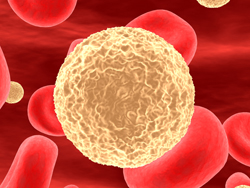The immune system’s role in intestinal inflammation
T-cells are a type of white blood cells collectively referred to as lymphocytes. T-cells, which mature in the thymus gland (hence ‘T’ cells), are an integral part of the body’s immune system. They become activated in response to certain foreign invaders or antigens (substances that cause production of antibodies) that are ‘presented’ to the T-cells by dendritic cells (DCs), another type of immune cell in the mammalian immune system. The whole system can be likened to the case where border patrol police (DCs) find foreign invaders (antigens) and present them to local authorities (T-cells) for expulsion (or, in this case, destruction). In addition to their role in normal immune response, T-cells and DCs are also involved in organ rejection (when a transplanted organ is deemed ‘foreign’ and undesirable to the body) as well as in autoimmune diseases and some allergic reactions. Aberrations in intestinal homeostasis, or the maintenance of a constant intestinal environment, have been linked to IBD. The ‘Intestinal dendritic cells and gut T-cell homing in inflammatory bowel diseases’ (GUT DCS IN IBD) project was designed to investigate mechanisms for maintaining immune homeostasis in tissues exposed to high levels of antigens such as intestinal tissue. The researchers cultured human blood DCs in a normal intestinal microenvironment and compared them to those cultured in an IBD microenvironment. The DCs conditioned in the IBD environment failed to display homeostasis and became more stimulatory for T-cells. They then identified two factors involved in the differential responses of DCs cultured in a healthy versus an IBD microenvironment. Intestinal retinoic acid (RA) controlled acquisition of gut-homing (focusing migration of the response to the gut) both by DCs and the T-cells they stimulated without affecting the level of stimulation. Intestinal TGF-beta (transforming growth factor beta), a family of immunoregulatory proteins, induced lower stimulation without an effect on homing. Project results provide new insight into the mechanisms of regulatory versus homeostatic intestinal immune activity in particular as related to IBD. Continued research should point the way to potential new tissue-specific therapies for IBD in the fields of immuno-nutrition and development of DC-related vaccines.







